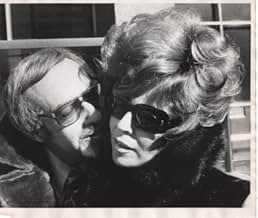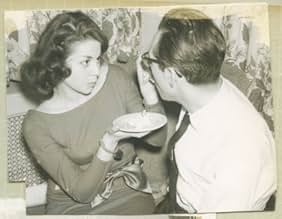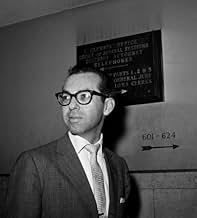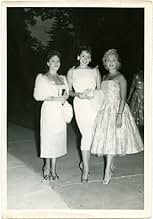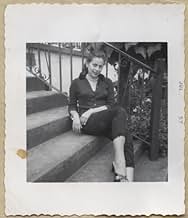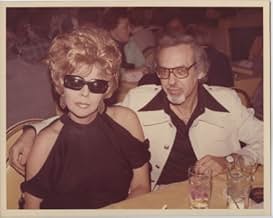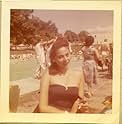Ajouter une intrigue dans votre langueThe bizarre true story of Linda Riss and Burt Pugach.The bizarre true story of Linda Riss and Burt Pugach.The bizarre true story of Linda Riss and Burt Pugach.
- Réalisation
- Scénario
- Casting principal
- Récompenses
- 5 victoires et 5 nominations au total
Linda Pugach
- Self
- (as Linda Riss)
Norman Ackerman
- Self - Psychiatrist
- (as Dr. Norman Ackerman)
William Kunstler
- Self - Defense Attorney
- (images d'archives)
Evangeline Borja
- Self
- (images d'archives)
Avis à la une
The nice thing about this story is that it doesn't show what it pretends to--that with age comes wisdom. It shows that demented people are walking around us all the time and you can even be married to one so stay awake and never sleep while dating. Burt is a sociopath with psychopathic tendencies. Linda is a lovely girl who is stuck on herself. It's a union made in Hell. He is pretty much unrepentant after disfiguring her, but supposedly still in love with her (huh-Brooklynese)! She is frightened out of her mind but still able to be wooed by him (her ego demands satisfaction). He is a known whore, she's a tease. It's inevitable that people like this are drawn to each other in life. The only remorse he shows is in getting old. He's upset that he has no cachet anymore, not that he frigged up a woman's life. Their faces reveal the delight at being able to 'tell their stories' after all these years and that anyone would care enough to watch. We have become the ultimate voyeurs. Most of the friends, family, witnesses are elderly boozed out/smoked out floozies and pimps. It could have cult status. It's a film that ought to have been made by John Waters. Watch it knowing that these people have lived and learned nothing. Watch it knowing that though you'll try, you probably will NEVER reach beyond your high school mentality. Who you are in h.s. is basically who you are the rest of your life regardless of career, style, money, etc. A thug is a thug is a thug. A cheerleader is a cheerleader is an old cheerleader.
I'm reminded of the line from a Chris Rock special where he's talking about gay people should be allowed to married and "be as miserable as everybody else." How about passive-aggressive? One may try and pin-point Burt Pugach as being such, though he's not the easiest sort of character to crack. Or, maybe he is: a pioneer in the field of ambulance chasers, he laid eyes on a woman one day in the late 50s in the Bronx and knew he had to have her. She wasn't that easy, albeit he was pretty rich as a lawyer/movie producer, and had all sorts of nifty objects. But, low and behold, he was really married, and once found out kept stalling on getting divorced. Why exactly I'm sure only Burt, and his eventual ex-wife, could say, but it lead down a path of one of the most bizarre cases of 'tainted love' one could ever find: blindness by acid, jail-time, near poverty, and finally a strange reconciliation and marriage between stalker and stalkee.
If you don't know the tale of the Pugach's, as I did, some of this may come as something of a surprise (the glasses Linda wears, at first, seems like a simple fashion gimmick, until the real reason comes out- and sight of her eyes as they are today), but what makes the film work best is seeing it as a surreal human interest story. Like Capturing the Friedmans, you'll leave the theater or finish watching at home and it will get you talking not so much in a gossip kind of way as the newspapers originally made it out to be as a huge story (the kind that, had it come out today, would be probably the only news for a week on the cable channels), but as if these people are almost like characters in a movie. How could Burt's first wife stand all this, or even marry him? Didn't Linda know that Burt could go one step further following her engagement to Larry Schwartz? How could the two of them stay together even after there was ANOTHER big charge put against Burt in the 90s with another woman claiming damages? All these questions, and more, may be prevalent, but in the end it doesn't matter too much.
What Crazy Love is is sincere entertainment, where there's real truth in it- the circumstances following Linda's blindness, leading to a sort of existential crisis leading up to Burt, mostly for the money, truth be further told- and lots of dark humor as well. It may be a little exploitive perhaps, but seeing photos of Burt in the 70s after getting out of prison are some of the most demented photos, I've ever seen of a man, with his beard looking like what a character playing the devil might wear (not that he is the devil, just a, well, lying ambulance chaser). There's also some humility in seeing how, in a way, the marriage that Burt and Linda ended up in may not be too far removed, in seeing them on screen anyway, from how people you know might act- which is a level of discontentment and misery, but also the feeling that things can't get much worse.
It's not a great documentary, as sometimes the editing is a little jerky, and the last transition from previously cool songs to a mopey ballad the couple dance to is not good at all. But it's got many qualities that make it very watchable- unpredictability (or predictability, depending on point of view or knowledge of the material), a real sense of time and place (great Bronx locations), and two people and their friends and witnesses who can attest to the biggest puzzle of them all: how could they get back together after what happened?
If you don't know the tale of the Pugach's, as I did, some of this may come as something of a surprise (the glasses Linda wears, at first, seems like a simple fashion gimmick, until the real reason comes out- and sight of her eyes as they are today), but what makes the film work best is seeing it as a surreal human interest story. Like Capturing the Friedmans, you'll leave the theater or finish watching at home and it will get you talking not so much in a gossip kind of way as the newspapers originally made it out to be as a huge story (the kind that, had it come out today, would be probably the only news for a week on the cable channels), but as if these people are almost like characters in a movie. How could Burt's first wife stand all this, or even marry him? Didn't Linda know that Burt could go one step further following her engagement to Larry Schwartz? How could the two of them stay together even after there was ANOTHER big charge put against Burt in the 90s with another woman claiming damages? All these questions, and more, may be prevalent, but in the end it doesn't matter too much.
What Crazy Love is is sincere entertainment, where there's real truth in it- the circumstances following Linda's blindness, leading to a sort of existential crisis leading up to Burt, mostly for the money, truth be further told- and lots of dark humor as well. It may be a little exploitive perhaps, but seeing photos of Burt in the 70s after getting out of prison are some of the most demented photos, I've ever seen of a man, with his beard looking like what a character playing the devil might wear (not that he is the devil, just a, well, lying ambulance chaser). There's also some humility in seeing how, in a way, the marriage that Burt and Linda ended up in may not be too far removed, in seeing them on screen anyway, from how people you know might act- which is a level of discontentment and misery, but also the feeling that things can't get much worse.
It's not a great documentary, as sometimes the editing is a little jerky, and the last transition from previously cool songs to a mopey ballad the couple dance to is not good at all. But it's got many qualities that make it very watchable- unpredictability (or predictability, depending on point of view or knowledge of the material), a real sense of time and place (great Bronx locations), and two people and their friends and witnesses who can attest to the biggest puzzle of them all: how could they get back together after what happened?
The bizarre true story of Linda Riss and Burt Pugach.
Manohla Dargis of the New York Times called the film "somewhat sickening, mildly gonzo" and added, "Crazy Love takes a mildly hyperventilated approach to its subject; there's a hint of tabloid sensationalism, a splash of kitsch sentimentalism." This is all very true and it is just an incredible story overall, bringing in William Kunstler, the Attica Riot, and other events in the history of New York. Was this a story that will make the history books? No. But it is among the strangest true crime stories ever to occur, and luckily somewhat was clever enough to track down all the interested parties for posterity.
Manohla Dargis of the New York Times called the film "somewhat sickening, mildly gonzo" and added, "Crazy Love takes a mildly hyperventilated approach to its subject; there's a hint of tabloid sensationalism, a splash of kitsch sentimentalism." This is all very true and it is just an incredible story overall, bringing in William Kunstler, the Attica Riot, and other events in the history of New York. Was this a story that will make the history books? No. But it is among the strangest true crime stories ever to occur, and luckily somewhat was clever enough to track down all the interested parties for posterity.
So well done, capturing the above-ground kind of rationale that tries to exculpate horrible behavior as normalcy. This showcases the kind of hat trick that attempts to make apartheid and brutality acceptable, rationale behavior. Sadly, accepted in certain cultural circles but nonetheless is still unequivocal evil. This should be used to illustrate and teach how pathology and selfishness can be romanticized as mythic. Truly- love does not conquer all nor does it excuse the means to the end. It is stunning that this man was not identified as the sociopath that he is and permanently removed from society.
"Crazy Love" again shows us just how compelling real people and situations can be when compared to their fictional counterparts. The screenwriter has not yet been born who could come up with such a detailed, character-rich, period-to-present story. Simply outrageous, you can smell the ink of the old New York tabloids wafting from the screen. This film is endlessly entertaining, fascinating, scary, funny, familiar, confusing and confounding. I think that New Yorkers will find the film and it's tone particularly interesting. The stock footage and stills are outdone only by the amazing Bronx/Brooklyn-ese accents whining from this quirky but genuine group. Think of it, single scandalous crime whose layers have been evolving and unfolding for 50 years now. A must see!
Le saviez-vous
- AnecdotesThis documentary took two years to make.
- Bandes originalesLinda
Written by Jack Lawrence
Performed by Buddy Clark with Ray Noble and His Orchestra
MPL Music Publishing, Inc. (ASCAP)
Courtesy of Columbia Records
By Arrangement with Sony BMG Music Entertainment
Meilleurs choix
Connectez-vous pour évaluer et suivre la liste de favoris afin de recevoir des recommandations personnalisées
- How long is Crazy Love?Alimenté par Alexa
Détails
- Date de sortie
- Pays d’origine
- Site officiel
- Langue
- Aussi connu sous le nom de
- Love Is in the Air
- Lieux de tournage
- Queens, New York City, New York, États-Unis(apartment)
- Société de production
- Voir plus de crédits d'entreprise sur IMDbPro
Box-office
- Montant brut aux États-Unis et au Canada
- 301 027 $US
- Week-end de sortie aux États-Unis et au Canada
- 17 952 $US
- 3 juin 2007
- Montant brut mondial
- 357 659 $US
- Durée
- 1h 30min(90 min)
- Couleur
- Mixage
- Rapport de forme
- 1.85 : 1
Contribuer à cette page
Suggérer une modification ou ajouter du contenu manquant




